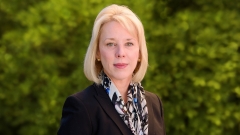ASU Law expert: Jury selection poses challenges for Trump's upcoming trial
For the first time in U.S. history, a former president is facing criminal charges. On Tuesday, Donald Trump was charged with 34 felony counts of falsifying business records.
The case is an outlier that makes business as usual, well, exceptionally unusual. The courts are not exactly throwing out the rule book, but certain procedures are being reconsidered, readjusted or just plain put aside.
This applies to everything from handcuffs and fingerprints to the jury selection. Last month, a judge ordered an anonymous jury for Trump’s upcoming civil trial. It's a process typically reserved for terrorists or organized crime cases; concerns about harassment and violence prompted the decision.
ASU News spoke with Stefanie Lindquist, a Foundation Professor of law and politics in Arizona State University’s Sandra Day O'Connor College of Law, about the daunting task of finding 12 impartial jurors for Trump’s high-profile trial.
Question: What challenges do attorneys face in choosing jurors for a high-profile trial like Trump’s?
Answer: It could be an extreme challenge. Trump may be the most polarizing figure ever in American politics. He is certainly the most polarizing figure in the 21st century. So the attorneys will have a more difficult time assessing whether jurors are unbiased. Attorneys may ask potential jurors about their political views, although the presiding judge may place limitations on such questions. But there are plenty of proxies today to assess a juror’s political leanings, including questions about where the juror gets most of her or his news.
Q: Looking back in history, what other high-profile cases faced similar challenges in selecting the jury?
A: There are really no other high-profile cases involving a president that went to jury selection in the past century that I’m aware of — certainly not in a criminal context. Former President Bill Clinton was sued by Paula Jones in a civil suit that was green-lighted by the Supreme Court, but Clinton settled the suit with Jones before jury selection. Past Vice President Spiro Agnew pled no contest to a single charge of tax evasion. Changes of venue are sometimes granted to avoid a potentially locally biased jury pool, but in a case of national significance, such as Trump’s, the saturation of news coverage nationwide and the extreme polarization in the electorate will likely make jury selection all the more difficult.
Q: The judge assigned to Trump’s upcoming trial called for an anonymous jury. What was behind this decision?
A: Political violence has, unfortunately, become a feature — rather than a bug — in American society today. Jan. 6 is one obvious example, but social media has empowered and emboldened militia groups and other extremists — e.g., Pizzagate. Protecting the identity of the jurors is intended to protect them from retaliation for their public service. In this case, defendant Trump has a propensity to single people out by name on social media if he thinks they have victimized or insulted him. This makes the potential threat to jurors all the more real.
Q: How will an anonymous jury work?
A: I have never been involved in the selection of an anonymous jury, but my understanding is that the names of the jurors on an anonymous jury are not even known to the parties in the case. Voir dire can proceed, of course, but the identities of the jurors are known only to the court. Some observers have claimed that anonymous juries are undemocratic and create a judicial system cloaked in secrecy. But anonymity reduces the likelihood of jury tampering and protects jurors from harm by dangerous defendants or their affiliates. In this case, it could be dangerous for the jurors’ identities to be known to some of the defendant’s more extreme followers who have promoted violence in the past, including on Jan. 6.
Q: What will attorneys be looking for in a juror?
A: Defense attorneys are looking for an open-minded juror who will consider the evidence on a clean slate. Prosecutors may look for “law and order” types who are more inclined to abide by rules.
Q: Given the political demographics of New York City, is it possible to find impartial jurors for this case?
A: This challenge has already been met in the Trump Organization trial for tax fraud. Reports indicate that it was very difficult to find qualified jurors, but eventually the parties did so and the case was concluded with a jury verdict. The criminal case directly against Trump is more fraught, of course, because the case involves Trump personally. This situation is therefore even more challenging. Some of the juror comments during the voir dire in the case against the Trump Organization are telling — with one potential juror noting that the Trump controversies had adversely affected his health both physically and mentally, and for that reason he did not want to serve as a juror. Nothing about the Trump criminal trial will be normal, and that goes for jury selection as well.
Top photo: The Trump Tower on Fifth Avenue in New York City. Photo by bluebeat76/iStock
